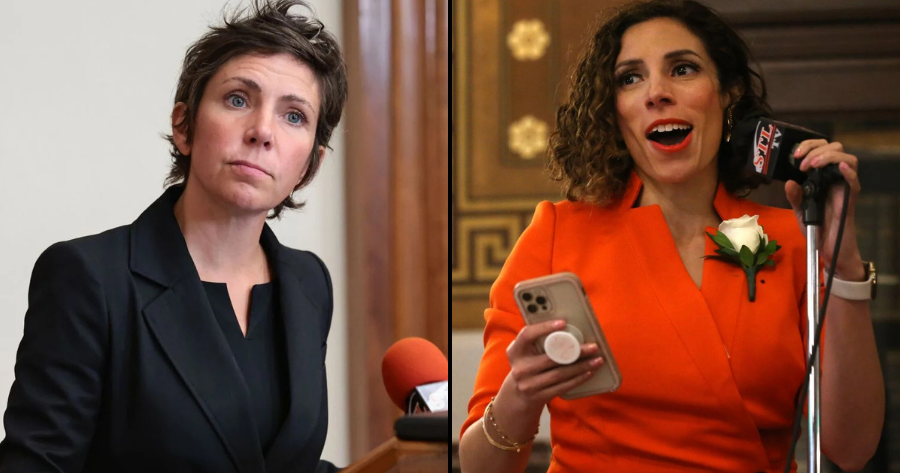
Joe Holleman | Post-Dispatch
Political correspondent/columnist
Get email notifications on {{subject}} daily!
Your notification has been saved.
There was a problem saving your notification.
{{description}}
Email notifications are only sent once a day, and only if there are new matching items.
Followed notifications
Please log in to use this feature
Log In
Don’t have an account? Sign Up Today
ST. LOUIS — A recent social-club dinner was punctuated by a decidedly unsociable confrontation between the mayor and an alderwoman.
The topic that touched off the clash Sept. 16 was an effort to install a city-manager form of government in St. Louis, a move that would sap a substantial amount of power from the mayor’s office.
According to sources, the curt dialogue between Mayor Cara Spencer and Alderwoman Daniela Velázquez happened at the 122-year-old St. Louis Woman’s Club in the Central West End. Spencer was the special guest in a question-answer forum.
“How did you hear about that?” Spencer said in an interview when asked about the exchange.
Neither Spencer nor Velázquez would comment about the tone of the exchange — or any specific words used — but neither denied that the exchange could be viewed as confrontational.
Since early this year, Velázquez has been holding meetings with staffers of the city’s three Estimate Board members: Spencer, Comptroller Donna Baringer and aldermanic President Megan Green. Velázquez said the meetings were aimed to help put the issue before voters as a City Charter change.
Along with changes in mayoral powers, revisions to the city’s personnel department and procurement policies also are being reviewed.
One source said that during one meeting of Velázquez and the Estimate Board staffers, held the day of the club dinner, some staffers suggested that Velázquez slow her pursuit of the city manager matter.
The request to “pump the brakes,” as one source described it, prompted Velázquez to approach Spencer at the dinner and ask the mayor about problems with the proposal.
That’s when the pointed dialogue occurred.
Spencer said in an interview that the dinner was “neither the time nor the place” to discuss the city-manager issue.
Spencer said her office extended the dinner invitation to Velázquez, but emphasized it was not to discuss city business.
“It was just a social thing, a courtesy,” Spencer said, adding that she also invited the city’s newest alderwoman, Jami Cox Antwi.
Antwi said she talked with Spencer and Velázquez at the dinner but was not aware of the specifics of the “side conversation” between the two.
“What I am aware of is that they have different positions, they’re on different ground now,” said Antwi, who added that Velázquez had been told by Spencer’s camp that the issue was “at a pause point.”
As to the overall proposal, Spencer said she generally supports changes in city government.
“But any reorganization of the executive branch needs to come from the executive branch,” she said. “My position hasn’t changed on that issue.”
Besides, Spencer said, other events make it imprudent to seek the change immediately. One is the recent hiring of Ben Johnson as the city’s director of operations.
“And then we had this little thing called a tornado,” the mayor said.
Velázquez declined to comment on the specific conversation at the club.
But she repeated her position — first stated early this year when Tishaura O. Jones was mayor and opposed the change — that the bill never has been aimed at any specific mayor.
“My focus is on good government,” Velázquez said.
One local political scientist pointed to the obvious devil in the details: the change would strip a mayor of significant political power.
“Anyone in a position of power is going to naturally be hesitant to relinquish that power,” said Anita Manion, a political science professor at the University of Missouri-St. Louis. “And that’s true from mayors up to presidents.”
Under Velázquez’s proposal, the city manager would hold the position from mayor to mayor (unless removed for cause) and would oversee the heads of most departments that now report to the mayor, including the health, public safety, streets, trash, parks and building inspection.
The city counselor, who heads the city’s legal team, also would report to the city manager.
Velázquez said she believed there was support from Spencer because members of the mayor’s staff had been working with her.
But camaraderie shown in staff meetings does not necessarily indicate agreement, Manion said.
“It’s not just a mayor who’s invested in this, but also the higher-ranking (mayoral) appointees” who may be affected by the change, she said.
Manion also said that while it may not look good publicly to oppose a change promoted as a better form of government, “stalling is a tactic” that can be used to thwart the move.
Case in point: Last year in St. Louis County, Republican Councilman Mark Harder, a staunch foe of County Executive Sam Page, made moves to get an issue on a ballot for a professional-manager type of government, which would reduce the county executive’s power.
Harder drew opposition from Councilman Dennis Hancock, a fellow Republican, who said at the time: “This is not something that we want to rush through as a council.”
In March, Hancock declared himself as a 2026 candidate for county executive.
Be the first to know
Get local news delivered to your inbox!
* I understand and agree that registration on or use of this site constitutes agreement to its user agreement and privacy policy.
Joe Holleman | Post-Dispatch
Political correspondent/columnist
Get email notifications on {{subject}} daily!
Your notification has been saved.
There was a problem saving your notification.
{{description}}
Email notifications are only sent once a day, and only if there are new matching items.
Followed notifications
Please log in to use this feature
Log In
Don’t have an account? Sign Up Today



